#Quranic scholarship
Text
How long does it take to read Surah Yaseen?
The time it takes to read Surah Yaseen can vary depending on the reader’s speed and familiarity with the Arabic language. On average, it takes about 15-20 minutes to read Surah Yaseen in its entirety for a person who is able to read at a moderate pace and has a basic understanding of the Arabic language. However, it may take longer for someone who is new to the language or who reads at a slower…
View On WordPress
#Islamic practices#Islamic religion#Quran reading#Quran recitation#Quranic scholarship#Quranic studies#Quranic tradition#Surah Yaseen#Time management
0 notes
Note
you said that religion is actions and relations, not beliefs- would you be willing to elaborate and/or point to some reading? or like at least defining what "beliefs" means here?
sure. now i'm sure there's some much more recent scholarship on this but everything i think of this is fundamentally drawing on/extrapolating on the german ideology and gramsci's work--but the gist of it is that there is no (let us take an example) 'islam' that exists independent of its practicioners. this is a materialist (as opposed to idealist) stance on religion (& ideology more generally).
so what this means is that--sure, everything that comes under the umbrella of 'islam' does in fact share a few core concepts (the quran, the indivisbility of god, mohammad as a prophet)--but that attempts to make any sweeping generalized statement about the ideological content of islam are bound to fail because ultimately the islam of the iranian state apparatus & the islam of the taliban & the islam of muslim feminists in indonesia & the islam of the PLO & the islam of liberal arab-americans are all fundamentally different ideologically because they are shaped not by some eternal essence of islam but by the social circumstances and communities within which each of these groups is practing.
(want to be super clear that i am just using islam as an example here, the same can be applied to any religion in any place--christianity, for example, is not uniquely genocidal & colonial due to some inherent ideological content, which is why going through the bible to point out violence & slavery and being like 'see, this is what's wrong with christianity' is a futile exercise--christianity has been the religion of a genocidal & colonial ruling class across much of the globe, and so that practice of it of course takes on that character)
hence, for example, there's absolutely no contradiction between, say, the judaism of diaspora reform jews & that of the israeli state--the stark difference makes sense when you realize that they are not both informed ideologically by some inherent essence of judaism but by the historical context of centuries of persecution vs. decades of genocidal state building. no religion has an innate inextricable character--all character that a religion has is given to it when it becomes a social fact, and comes from the people who practice it and their material and power relations.
3K notes
·
View notes
Note
Saya want know how Qasim look,are you have proposal?(≡・x・≡)
(pics below) Qasim, the brother, is older than reader by 5 years. He has chocolate brown hair, thick messy locks, and green eyes. He's gifted with eiditic/photographic memory which made him excel in school and he obviously had a high IQ as well. Doesnt mean reader thinks he's intelligent. Sure, Qasim is book smart, but he's not- street smart. Y/n has been the one to often make him realise that his friends were taking advantage of him by making him do their homework, or that they were laughing at him not with him because of his intellect. But reader chalks it up to his sweet nature, her goody-two-shoes of a brother who was hafidh (memorised the Quran) would always be the forgiving person. Its not that he was a pushover, he just... preferred to be the bigger person. Always. He'd chuckle and ruffle your hair "so what if I cleaned up their mess? it only took me 5 minutes and the job was done. Its okay, Y/n." He's always so selfless. You used to worry that he'd get hurt because he's too kind, you used to think he couldnt stand up for himself because he just didnt know when to- but no. Qasim was quite protective over you. When he saw you trying to tackle one of his so-called bullies, the boy towering over you (but you dont consider the height advantage, not when youre a raging kitten), Qasim stepped in and landed a single punch that knocked him down. (then big bro had to spend the rest of the day consoling u because you made him fight someone- and in ur head, that was the biggest sin u made him commit).
Qasim in Arabic means "the generous one" or "the one who shares", and being the older bro, he took his name quite literally. You were the younger sibling, the spoiled brat, the princess! But Qasim never had any problems with sharing anything with you, be it materialistic things or advice or even knowledge. You memorised Quran by his help (because u were competitive) and he had the extraordinary patience of a saint. You two would often participate in competitions at the local mosque just to get the cash prize and help your parents a bit (they never took ur guys money, encouraging u to either save it or spend it on something). Since both of your parents worked long hours, you two were left unsupervised for a long time and that only meant genius yet chaotic shenanigans, including prank calls to the pentagon hq.
Qasim grew up to get a lot of full ride scholarships from top colleges, and once he did his masters (a STEM major), he decided to start his own travel agency, surprising everyone because it seemed like something he wouldnt do? Everyone expected him to go into sciences, but he said he liked to travel and see the world, and Qasim told you that he enjoys running his own business, being your own business.
You supposed it made sense because he was a polyglot and he did enjoy learning new things and seeing new places, their history, etc. Due to his job, he would be gone for long months at a time, but he never returned empty handed. His arms full of souvenirs and sweets and BOOKS! Its not that he bought them for u, no. He bought those books for himself, but once he read them- he's already memorised it and he doesnt have anymore space in his home for more books, so he's always dropping them by your place (as kids, u made him memorise the phonebook before hiding the entire neighbourhoods phone books and had people pay to use your brother's memory for contacts, which was a good business until your father busted it down).
Qasim is the softest, kindest, most generous person. Even though he has a busy schedule due to work, he always made time for you. Whenever he came by, especially during your finals season, not only did he help you study, but he would also stock up your fridge and made sure to do some maintenance around your house. Fridge not working? Qasim has the tools, and if you werent so tied up with studying, you wouldve freaked out over him disassembling your fridge like lego. Sink clogged? No need for the plumber, Qasim knows the right potion of chemicals to unclog it. He's always been the one to prefer to do things himself, by his hand rather than relying on help.










what do u guys think???
118 notes
·
View notes
Text
Shoemaker on literacy, memory, oral tradition, and the Quran:
Studies of literacy in pre-Islamic Arabia have been severely overlooked in recent Quran scholarship; in fact, literacy in the 7th century Hijaz was "almost completely unknown" and "writing was hardly practiced at all in the time of Muhammad." "[T]here seems to be a widespread agreement among experts on the early history of the Arabic language 'that, before and immediately after the rise of Islam, Arab culture was in all important respects fundamentally oral.'" Ancient graffiti in the region seems to have been a bit like early runic writing in Scandinavia--not central to the culture, mostly decorative and incidental, and certainly not used for long, important texts. "There is, in effect, a lot of 'Kilroy was here' scattered across the Arabian desert." Indeed, most of these graffiti are personal names or private in nature--we're not talking monumental inscriptions here, we're talking bored herders scratching stuff onto rocks to pass the time.
Southern Arabia and the larger oases to the north had more in the way of literate elites (and thus things like monumental inscriptions), but these places were far from the central inland Hijaz. If someone in this region did want to become literate, they would probably have learned to read and write in Greek or Aramaic, which were useful and important linguae francae.
As in very early Christianity, writing occupied a controversial position vis a vis orality--oral tradition was primary for the production and transmission of culturally important things like religious texts, poetry, literary prose, genealogy, and history. The shift to a literate culture came only with the expansion of Muhammad's polity into a wealthy, multicultural empire rather than a tribal state. Indeed, much of the early Caliphate's administration used Greek and other languages--Arabic entered administration only slowly, since a lot of early bureaucrats were drawn from the Roman and Sasanian bureaucracy.
And like early Christianity, another reason not to feel any urgency to write down Muhammad's teachings was that early Muslims expected the end of the world to come very soon, maybe initially even before Muhammad's own death.
The dialect of the Quran is distinctive and unusual; it is very difficult to locate where this dialect might have originated. Ahmad Al-Jallad tentatively identifies an Old Hijazi dialect, but the evidence for this dialect (besides the Quran itself) is limited and mostly much more recent, and he assumes the Quran was produced in the Hijaz.
The Arabic of the Quran can probably be identified with the prestige dialect of Levantine Arabic in the Ummayad period, but the origin of that dialect, and what Arabic dialects were brought together there in that time, is hard to ascertain with certainty.
Shoemaker thinks the Quran started as short collections drawn from individual memories following the conquest and encounters with widespread literacy; these collections would have been considered open, and subject to influence from oral tradition. They were combined into increasingly larger collections, with additional traditions and revisions, emergin as something like divergent versions of the Quran (though still not fully static and closed). Finally, the traditions of these regional versions, with other written and oral traditions, were fashioned into their canonical form under Abd al-Malik, and this version was progressively enforced across the empire.
Shoemaker brings in memory science and the anthropology of oral cultures: memory is highly frangible and fallible. Even though it functions well for day to day tasks, it's important not to overlook how common misremembering and re-remembering alters information in both personal and collective memory when talking about a text that even Islamic tradition agrees was not written down within Muhammad's lifetime.
Most forgetting occurs shortly after an event in question; a small core of memories we develop about an event will persist for a significant time after. These findings have been corroborated both in the lab and in the circumstances of everyday life.
Memory is not primarily reproductive; literal recall is, in evolutionary terms, pretty unimportant, and brains omit needless detail. Remembering thus involves a lot of reconstruction more than it does reproduction; memories are storied piecewise in different parts of the brain, and are assembled on recall, with the gaps being filled in using similar memory fragments drawn from comparable experiences.
Note Bartlett's experiments using a short Native American folktale; when asked to recall this story, even after only fifteen minutes participants introduced major and minor changes. Subsequent recall didn't improve accuracy, though the basic structure of the memory developed pretty quickly in each individual. But this structure was not especially accurate, and significant details vanished or were replaced with new information. Most often this information was drawn from the subject's culture (in this case, Edwardian England), forming a memory that made more sense to them and had more relevance in their context. The overall style was quickly lost, and replaced by new formations, and there was a persistent tendency to abbreviate. After a few months, narrative recall consisted mostly of false memory reports, a finding verified by subsequent replications of his experiments.
Experiential and textual memory in particular degrades very rapidly; this degredation is much faster when information is transmitted from one person to another. Epithets change into their opposites, incidents and events are transposed, names and numbers rarely survive intact more than a few reproductions, opinions and conclusions are reversed, etc. Figures like Jesus or Muhammad will hardly be remembered accurately even by people who knew them.
The style of the Quran (e.g., prose, and often terse, elliptic, and occasionally downright nonsensical prose at that) does not lend itself to memorization; Shoemaker argues it is only possible for people to memorize the Quran now because it has become a written document they can consult in the process.
Eyewitness testimony is of course also notoriously unreliable, despite what apologists (in particular Christian apologists) have argued. Cf. Franz von Liszt's experiment in 1902, where a staged argument in a lecture escalates to one student pulling a gun on another--after revealing this event was scripted and staged, and asking different students to recall the details of the event at different intervals afterward, literally none of them got it right--the best reports, taken immediately, got things about one quarter correct. Even repeatedly imagining a scenario vividly enough can eventually lead to a false memory of it occurring (a phenomenon which may explain some alien abduction reports). People mistake post-even hearsay or visualization for firsthand knowledge, especially in the case of dramatic events.
What memory excels at is remembering broad strokes--we are adapted to retain the information which is most likely to be needed, i.e., the gist (or, more likely, the broad themes) of events and information, and not its exact form.
There's a long digression here about John Dean's testimony on the Watergate conspiracy--this may be the first book in early Islamic studies to have Richard Nixon in the index.
Even competitive memory champions train for short-term recall of large amounts of information; they, and other people with preternaturally good memories, are of course exceedingly rare. It's very unlikely that someone could remember, several decades after the fact, precisely (or even mostly) what was told to them by their friend whose brother's wife's cousin was really there. So even within the traditional account of the Quran's composition, it makes no sense to claim it is in fact the verbatim word of Muhammad.
As in the case of Solomon Shereshevski, when you do have preternaturally good recall even for (say) lists of nonsense syllables, the result is actually kind of debilitating--you have so many useless details to sort through, it makes it quite hard to function at an abstract level. And hyperthymesiacs, though they exhibit a high level of recall about their past, still often remember things incorrectly, at about the same rate as people with normal memories--they are no less susceptible to false or distorted memories.
Nevertheless most modern scholars treat the Quran as a verbatim transcript of Muhammad's words. This is exceedingly unlikely! Especially given that "group" or "collaborative" memory--memories as reconstructed by individuals working together--appears to be even less accurate than individual memory. You get better results having people try to recall events by themselves.
Since during the age of conquests the majority of converts were not closely preoccurpied with the interpretation of the Quran, it would have had to have been rediscovered and hermeneutically reinvented later; the memory of Muhammad's words were being shaped by the nature of the community he founded, as its members collective and individual needs continued to evolve along with the context of transmission.
Many people, both scholars and the general public, seem to believe that people in oral cultures have remarkable capacities for memory not possessed by those of written cultures. Study of oral cultures has shown this is demonstrably false; literacy in fact strengthens verbal and visual memory, while illiteracy impairs these abilities. People in literate cultures have better memories!
Oral transmission is not rote replication; it is a process of recomposition as the tradition is recreated very time it is transmitted. Oral cultures can effectively preserve the gist of events over time, but each time the details are reconstituted, and the tradition can radically diverge from its first repetition, with the stories of the past being reshaped to make them relevant to the present and present concerns.
The collective memory of Muhammad and the origins of Islam as preserved in the Sunni tradition would have forgotten many details as a matter of course, many others because they were no longer relevant to the later Sunni community, and they would have been reshaped in ways that made them particularly suited to the life and community of their contemporary circumstances, exemplifying and validating their religious beliefs--ones very different from those of Muhammad's earliest followers.
The early Muslim conquests put a comparatively small number of soldiers, scattered across a huge territory, in a wildly different cultural and social context, especially in close contact with different Christian and Jewish communities, esp. in the Levant, which rapidly became the cultural center of the new empire. Jews and Christians may have joined the new religious community in large numbers in this time also; their faith and identity would have continued to evolve in this period, as we would expect from comparative episodes in the history of other religions. By the time that Muhammad's teachings were formally inscribed, the memories of his few hundred initial companions would have been transmitted and dispersed to a large number of people in a totally different set of circumstances, with consequences for how those memories exactly were recalled.
Jack Goody, researcher on oral traditions: "It is rather in literate societies that verbatim memory flourishes. Partly because the
existence of a fixed original makes it much easier; partly because of the elaboration of spatially oriented memory techniques; partly because of the school situation which has to encourage "decontextualized" memory tasks since it has removed learning from doing and has redefined the corpus of knowledge. Verbatim memorizing is the equivalent of exact copying, which is intrinsic to the transmission of scribal culture, indeed manuscript cultures generally."
Techniques like the ars memoriae belong to literate cultures and were invented by literate people; they are unknown in oral cultures. Oral and literate cultures in fact have a radically different idea of what it means for a text to be "the same"--in the former, word-for-word reproduction is not necessary. A poem can be "the same poem" even if every time it is performed it is largely unique.
Case of the Bagre, the sacred text of the LoDagaa people of Ghana, an extended religious poem used in a liturgical context. Variations in its recitation aren't just variations in wording; changes in recitation can be radical, and the last version is always the starting point. Nevertheless (as in other oral cultures) it is considered "the same," functionally identical with each recitation. These differences appeared even among different performances by the same reciter, or multiple times in the same ceremony. Even the most formulaic parts have great variability. Similar variability in oral texts in other oral cultures has been documented by other anthropologists, including for historical events.
Shoemaker notes that the tradition that the Vedas were transmitted without variation from the time of their composition remains an article of faith in some quarters of South Asian studies; this flies in the face of all available evidence. In fact we have no idea what the state of the Vedic texts was prior to the earliest manuscripts; they may have been written all along.
Collective memory is shaped by contemporary cultural imperatives--examples of Abe Lincoln, a white supremacist considered nothing special by his peers; Christopher Columbus, once revered; the last stand at Masada, considered a minor event of little importance to broader Jewish history until the founding of Israel.
There doesn't have to be any conspiracy or coordinated effort for false narratives about the past to take root.
The hard horizon of communicative memory is around eighty years; so historical consciousness basically only has two modes: the mythic past of collective memory, and the recent past less than eighty or so years ago.
Lack of a clear "generic" monotheism in the Hijaz around the time of Muhammad's birth means the expectations and memory of Muhammad would have been profoundly shaped by Christian and Jewish beliefs.
Early Islam, like early Christianity, wasn't old enough to have a clear distinction between historical/origins memory and recent/communicative memory.
"For most of the seventh century, then, Muhammad’s followers had a memory that was still immersed in the social and cultural milieux of the late ancient Near East, from which they had yet to clearly differentiate themselves. They eventually would do this in large part by developing a distinctive collective memory for their group, different from those inherited from Judaism and Christianity, a process that was no doubt delayed by their fervent belief that the world would soon come to an end, making such an endeavor rather pointless for a time. Only as the end continued to remain in abeyance, and the community’s living memory grew ever distant from the time of origins did they develop a collective memory of their own. Yet, as Islamic collective memory began to evolve, one imagines that it initially took different shapes within the various pockets of Believers that were scattered across their empire. The basic elements of this nascent collective memory were, as Halbwachs says of the early Christians, “still dispersed among a multitude of spatially separated small communities. These communities were neither astonished, anxious, nor scandalized that the beliefs of one community differed from those of another and that the community of today was not exactly the same as that of yesterday.” Thus, we should expect to find a significant degree of diversity in religious faith and memory among the different early communities of the Believers, scattered and outnumbered as they were among the Jews and Christians of their burgeoning empire. Only with ʿAbd al-Malik’s program of Arabization and Islamicization was a new, distinctively Islamic collective memory and identity concretized and established for this new religious community. It was a collective identity that was formed from the top down and imposed, at the expense of any other alternative collective memories, with the full power and backing of the imperial state."
The limits of oral tradition apply even more strongly to the hadith and biographies.
69 notes
·
View notes
Text
Does Education Change People’s life?
Kemarin kan ke Bandara nyenpetin ketemu kaivan yang transit di Melb sebelum ke Brisbane, seperti biasa kalau ketemu Kaivan tuh banyak banget yg dibahas, termasuk mbaknya kaivan yang resign terus beliau nyari lagi platform Maisyah.Id, sama kaya waktu aku cari ART.
Terus kaivan cerita kalau yg ngelamar tuh pada beyond expectation banget. Sampe yang sekarang akhirnya diambil sama kaivan itu anak FKM UI (UI Loh UI!) tapi jadi ART karena putus kuliah di tengah jalan karena nggak ada biaya :( anaknya pinter, mudah diberikan arahan bahkan bisa nyetir. Tapi ternyata agak ada gangguan jiwa karena suka tiba2 ngomong sendiri. Jujur seddihhhhhh bgt dengernya :( gak kebayang rekkk, beban yang ditanggung anak itu juga sampe dia agak2 halusinasi kaya gitu huhuhu :(
Sebagai anak yang mengamini bahwa pendidikan can change and leverage people’s life, makanya waktu itu kan gue maksa pindah dari UIN ke UI karena ngerasa lingkungan UIN gak oke banget untuk berkembang. Bahkan waktu itu gue mau apply scholarship malah ditanya gue lulusan pesantren mana krn yg boleh apply cm lulusan pesantren while itu gak tertulis dipersyaratannya like???!
Anyway, despite of my life story. Kujuga berusaha untuk menerapkan itu ke pengasuhnya Hannah. Dia lulusan salah satu SMA terbaik di Jakarta tp nggak bisa kuliah karena kehalang biaya (ANJIR PAS NULIS INI GUE MAKIN MARAH COY SAMA BADJINGAN-BADJINGAN KORUPTOR DAN PEMERINTAH YG HURA-HURA NGABISIN DUIT BUAT HAL GAK ESENSIAL). Akhirnya kutawarin untuk kuliah di UT, alhamdulillah udah mau masuk semester 3 dan semoga bisa terus lancar sampe nanti lulus di semester 8.
Walau di 2 semester ini kulihnya masih full online karena turbulensi keluarga dia yg terjadi (kupindah ke Oz, dia jadi hrs pulang ke rumah dan mengurus rumah krn bapak ibunya cerai hiks) tapi semoga ada hal baik yg bisa dia dapat dari perkuliahan dia.
Gue berusahaaa bgt untuk support dia sebisa gue. At least if i can’t be “bermanfaat” buat banyak orang, i can “bermanfaat” untuk satu org lah. Itu prinsipnya skrg :(
Hari ini, dia berangkat ke Yogya. Dia emang pernah cerita ke gue kalau dia pengen banget ke Yogya karena belum pernah. Terus gue berpikir lah, ngapain ke yogya kl cuman buat jalan2, gue juga kondisinya disini nggak berlebihan. Dan kulihat waktu itu kontennya @zhriftikar yang lagi ambil sertifikasi baca qur’an dengan metode UMMI, kujadi kepikiran kenapa kakak ika (pengasuhnya Hannah) nggak ambil sertifikasi ini juga aja? Karena dia sblm kerja di aku sebenernya dia buka TPA kecil2an gitu di rumahnya, berbekal dia belajar tahsin di sebuah rumah Quran gratis (duh jd pengen punya juga!). Jadi akhirnya kuputuskan dia ke Yogya untuk belajar sampe sertifikasi metode UMMI biar pas dia pulang nanti dia bisa cari kerja dengan modal itu.
Beruntungnya, akutuh punya temen2 yang superrrrrrr baik selama di Yogya Alhamdulillah wasyukurillah alaa bini’maatihi taatimusshalihaat. Aku cerita sama Apik kalau kakak ika mau ke Yogya belajar quran, qadarullah dia nawarin kakak ika untuk part time di wuffy! YaAllah mau bgt laah krn aku nggak ngasih uang jajan juga buat dia, cuman ngongkosin.
Terus awalnya mau tinggal di asrama mahasiswa ibunya zahra, tp karena penuh, akhirnya kutanya ke Rave apakah kakak ika bisa tinggal di rumah Rave, dan ternyata bisa! YaAllah, rezeki! Rave malah juga seneng krn suaminya kerja di Solo jadi beneran yg pagi pergi pulang malem gitu. Dan kebetulan Rave juga belajar metode UMMI jadi bs berangkat belajar bareng sm Rave, Alhamdulillah 🥹
Jujur walaupun ku support dengan agak seadanya (biaya kuliah di UT tuh satu semester cuman 1.3 juta!) tapi kuselalu mendorong kakak ika untuk bisa punya kegiatan lain selain kuliah juga. Kemarin beberapa kali kuminta daftar beasiswa NICE, FIM 25, terus ada pelatihan apa gitu. Walau belum pernah lolos tapi semoga someday bisa lolos dan kakak ika bisa punha jejaring yang banyak dan keren.
Semoga kakak ika bisa belajar banyak di Yogya. Bisa ketemu temen2ku yang baik. Ketemu sama orang2 baik di Yogya dan Solo dan mulai membuka jejaring untuk dirinya.
Semoga, pendidikan bisa me-leverage hidupnya.

Bonus foto kakak ika excited bgt mau ke Yogya
14 notes
·
View notes
Text
Meet Zahara!
For my final blog post of the semester, I want to share Zahara’s story with language, culture, and her experience as a Dari and Persian speaker. Zahara inspired me to learn Persian and about its various dialects. As former neighbors, our bond grew from our shared backgrounds – Zahara’s Afghan heritage and my Palestinian roots.
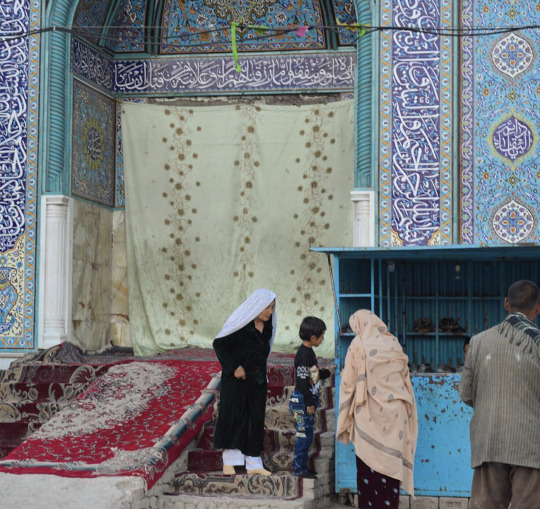
(Picture by Zahara, located in Afghanistan)
Her life began with Dari, a language deeply tied to her family. Born in Pakistan to parents from Bamyan and Kabul, she moved to the U.S. at the age of five. While in Peshawar, she was primarily surrounded by refugees from Afghanistan who spoke Pashto. Her time in Peshawar added a touch of Pakistani culture to her upbringing through the films she watched and food she ate.
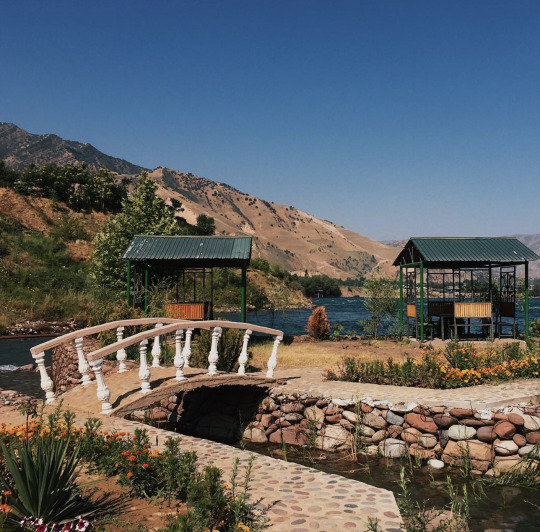
(Picture by Zahara, located in Tajikistan)
In America, learning English became became a priority for her family, overshadowing the importance of preserving her native tongue. Zahara found limited resources for Dari in Philadelphia’s small Afghan community, relying on old tapes from her time overseas maintain interaction with the language. As Zahara grew up, she learned the Persian script using the Quran, despite the challenge posed by the Arabic script having four fewer letters than Persian. She felt a gap between her language and culture. Leading into university, Zahara was disenchanted with Dari due to the lack of resources available to learn the language but this soon changed.
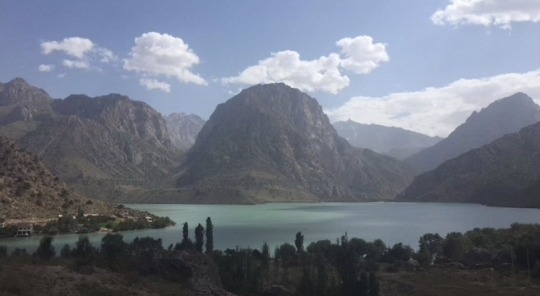
(Picture by Zahara, located in Tajikistan)
During college, a Middle Eastern studies course guided Zahara to the Critical Language Scholarship in Tajikistan. While in the program she reconnected with writing in Persian script and strengthened her literacy skills. Upon returning to the US, she continued to seek more opportunities to practice speaking, eager to improve despite the limited opportunities available to her. Her and her siblings now have a rule to only speak Dari with their parents in order to bolster their command of the language. To demonstrate the lack of local Persian education, she said explained the only formal academic program available in Philadelphia was at Penn and further cemented the importance of inheriting Dari orally in the West.
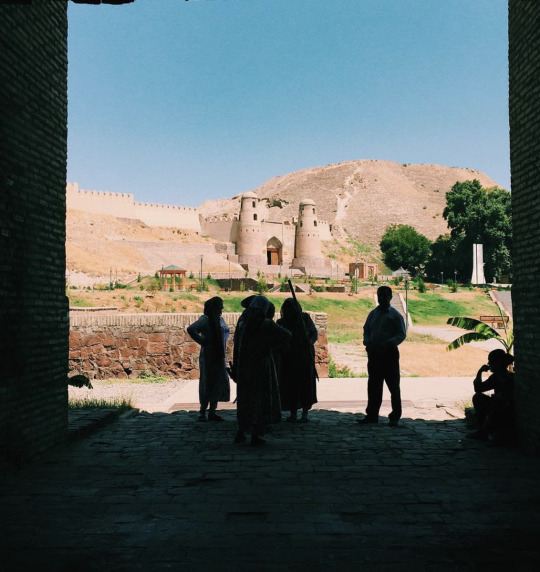
(Picture by Zahara, located in Tajikistan)
Zahara's experience underscores the importance of language in preserving cultural identity across generations. Zahara’s story also highlights the diversity of experiences in Dari and Persian speaking communities.
9 notes
·
View notes
Text
Learn quran with Thajweed

Tajweed, the set of rules governing the proper pronunciation and recitation of the Quran, is of immense importance for several reasons:
Preservation of the Quran: Tajweed ensures the Quran is recited as it was revealed to the Prophet Muhammad. Accurate pronunciation preserves the words' meanings and prevents distortion.
Proper Understanding: Correct recitation with Tajweed clarifies the meaning of the verses. Mispronunciations can alter meanings, leading to misunderstandings of the text.
Beautification of Recitation: Tajweed enhances the aesthetic and spiritual experience of reciting the Quran. The melodic and rhythmic recitation fosters a deeper emotional and spiritual connection.
Fulfillment of Religious Duty: Muslims believe that reciting the Quran correctly is a form of worship and a means of gaining reward from Allah. Following Tajweed rules fulfills this religious obligation.
Respect for the Sacred Text: Proper recitation shows reverence and respect for the sacred text. It demonstrates a commitment to honoring the Quran's divine origin.
Encouragement of Learning: Studying Tajweed encourages Muslims to engage more deeply with the Quran, promoting a culture of learning and scholarship within the Islamic tradition.
Key Aspects of Tajweed
Makharij al-Huruf: Points of articulation for each letter.
Sifaat al-Huruf: Characteristics of the letters.
Rules of Noon Saakin and Tanween: Nasalization rules.
Rules of Meem Saakin: Pronunciation rules for the letter "Meem".
Qalqalah: Echoing sound on specific letters.
Lengthening (Madd): Rules for elongation of certain sounds.
Learning Tajweed with us
Qualified Teachers: Learning under a qualified teacher ensures proper understanding and application of Tajweed rules.
Practice: Regular practice and recitation help in mastering the rules.
Listening to Skilled Reciters: Listening to renowned reciters can help in understanding the nuances of Tajweed.
By adhering to Tajweed, Muslims can maintain the integrity and beauty of the Quran, ensuring its correct transmission to future generations.
2 notes
·
View notes
Note
tw// CSA, if this triggers you feel free to delete!
Hello! You're the only ex-muslim I follow, so I decided to bring this to you. I'm an ex-Christian, and I came across this post:
(https://www.reddit.com/r/exmuslim/comments/1dh8lau/sexualization_of_kids_based_on_kilograms/)
I have to ask.. is this really true? Is this enforced in Muslim communities or taught to Muslims? As a fat woman who hopes to someday have children, which will likely be fat too due to my entire family being fat, I can't stomach the idea of this being permissible just because a child is fat.
Sorry if you can't read Arabic or don't know, I just wanted to make sure this isn't misinformation!
In general, the sexualization of young girls is something of a minefield in Islam and there is a long tradition of it, but in practice I would describe it modernly as (on average) a slightly more conservative version of fundamentalist Christianity.
The screenshots from islamweb are pretty representative of what you can find digging within Islamic scholarship. Islamic scholars have discussed specific laws regarding sex with prepubescent girls to absolutely nauseating degrees, but this is very much information that you're not taught at your average mosque sermon. In fact, I only learned about the gnarlier side of female sexualization when I independently started digging deeper during my own deconstruction of religion. If you showed the average Muslim these excerpts, they would likely a) believe they were doctored, or b) engage in some sort of apologia about historical context or validity or interpretation. Very few would actually be okay with the idea that it should or could be in use today.
And in general when engaging with Islamic scholarship and texts (including the Quran), it's important to note that the vast majority of Muslims have not read them nor do they know what they say (most Muslims have never read the Quran in their native language, because the medieval Arabic is praised for its beauty and purity, and even to modern Arabs it's not all intelligible).
Pretty much the average Muslim's understanding of Islam comes from attending mosque and Islamic school, and both tend to offer more sanitized and palatable versions. Which doesn't mean that the sexualization of young girls is thrown out the window, just made far less explicit.
Which is to say that the first image of the sign prohibiting girls over age 8/weighing over 30 kg from playing is odd but not so surprising. The prevailing victim-blaming ethos is that girls need to cover up and that their bodies are a temptation and need to be hidden/protected. In many communities including the one I grew up in, the age of 9 was when wearing the hijab and not doing anything that might flaunt your body in front of men begins. But of course, if a young girl “looks more mature” (i.e. has curves, which could be due to fat) then they’re expected to act accordingly.
All this is to say that while not overt misinformation, it's not an accurate or holistic representation of most Muslims' beliefs, so take it with a large grain of salt.
3 notes
·
View notes
Text

The quran states multiple times that it has been made clear and easy to understand. e.g.
https://quranx.com/2.242
Thus Allah expoundeth unto you His revelations so that ye may understand.
Which means it's really weird then that many verses begin with nonsense.
https://quranx.com/2.1
'Alif Lām Mīm
This doesn't mean anything, even in the original Arabic.
https://quranx.com/3.1
'Alif Lām Mīm
https://quranx.com/7.1
'Alif Lām Mīm Ṣād
https://quranx.com/10.1
'Alif Lām Rā'
https://quranx.com/11.1
'Alif Lām Rā'
https://quranx.com/12.1
'Alif Lām Rā'
https://quranx.com/13.1
'Alif Lām Mīm Rā'
https://quranx.com/14.1
'Alif Lām Rā'
https://quranx.com/15.1
'Alif Lām Rā'
https://quranx.com/19.1
Kāf Hā' Yā' `Ayn Ṣād
https://quranx.com/20.1
Ṭā' Hā'
https://quranx.com/26.1
Ṭā' Sīn Mīm
https://quranx.com/27.1
Ṭā' Sīn
https://quranx.com/28.1
Ṭā' Sīn Mīm
https://quranx.com/29.1
'Alif Lām Mīm
https://quranx.com/30.1
'Alif Lām Mīm
https://quranx.com/31.1
'Alif Lām Mīm
https://quranx.com/32.1
'Alif Lām Mīm
https://quranx.com/36.1
Yā' Sīn
https://quranx.com/38.1
Ṣād
https://quranx.com/40.1
Ḥā' Mīm
https://quranx.com/41.1
Ḥā' Mīm
https://quranx.com/42.1-2
Ḥā' Mīm
`Ayn Sīn Qāf
https://quranx.com/43.1
Ḥā' Mīm
https://quranx.com/44.1
Ḥā' Mīm
https://quranx.com/45.1
Ḥā' Mīm
https://quranx.com/46.1
Ḥā' Mīm
https://quranx.com/50.1
Qāf
https://quranx.com/68.1
Nūn
The quran also states that Allah protects it from corruption.
https://quranx.com/15.9
Indeed, it is We who sent down the Qur'an and indeed, We will be its guardian.
Many Muslims believe the Taurat (Torah) and Injil (New Testament), previous revelations by the same god, were "corrupted," and never consider why he would protect the quran, but not the torah or gospels. What the quran does say is that the quran confirms the previous revelations, rather than correcting them.
https://quranx.com/3.3
He has sent down upon you, [O Muhammad], the Book in truth, confirming what was before it. And He revealed the Torah and the Gospel.
Of course, if you were writing a bunch of nonsense fiction, you would probably stick something in there about how it was really, truly, actually true, and that you could know it was true because of the magic forcefield of protection that surrounds it. Any text that claims to be perfect and inerrant is the one of which you should immediately regard as unreliable; there's no reason to even say this unless you're trying to pull a fast one.
But this guardianship creates a problem for these nonsense verses, particularly since nobody in the authentic hadith ask about them or what they mean, suggesting they're later additions.
And the claim of the quran being clear and understandable is undermined by the fact nobody can understand them.
One reasonable possibility, considering the generalized trend of repetition across consecutive surahs, is that they're notations by scribes. But this is obviously unacceptable to the notion of Allah's revealed, protected word.
They've therefore taken on a mystical character, with entire fields of scholarship dedicated to understanding them. Hence the sardonic term "abracadabra verses."
If they are indeed just the annotations of scribes, this gives you an indicator of how completely stupid this religion is. imagine a theological domain dedicated to studying the margin notes written by an editor in a draft of a Harry Potter novel.
Among the theories are: some kind of mathematical miracle associated with the symbols; Allah's own notes, which is stupid for a revelation intended to guide humans; and abbreviations for Allah's qualities, along the same lines as the endlessly-repeated self-congratulatory statements such as "Allah is wise," "Allah is all-knowing," "Allah is just."
Then again, perhaps Muhammad Allah just got tired of starting everything off with "O, you who believe," "O, prophet," and the like. It still doesn't resolve the contradiction of the quran's claim to being clear and understandable, though.
#islam#quran#abracadabra#abracadabra verses#islamic nonsense#quranic nonsense#islamic scripture#religion#religion is a mental illness
23 notes
·
View notes
Text
Feast Day: Michaelmas, or St. Michael and All the Angels
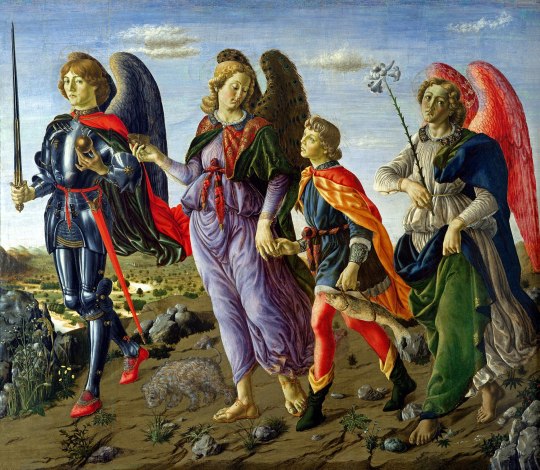
"The Three Archangels and Tobias" by Francesco Botticini (1470). Michael is on the far left, wearing some snazzy armour (via wikimedia commons)
Happy Michaelmas!
Michaelmas celebrates the Archangels Michael, Gabriel, and Raphael; and in Anglican and Episcopalian tradition includes two other angels from apocryphal (not in Biblical canon) texts named Uriel and Jerahmeel. However, as the name suggests, most of the day is about Michael. Regarded as the warrior who drove Satan out of heaven, Michael is associated strongly with protection and military might. He is the patron saint of police officers, warriors, the sick, mariners, against lightning and windstorms, and of many places including France, Germany, Vatican City, and Ukraine and its capital Kyiv.
Michaelmas was one of the major observed saint's days in mediaeval and early modern England, Scotland, and Ireland. Keep reading to find learn about how the Devil was yeeted from heaven, if you're going to get married soon, and why you shouldn't eat blackberries after October 10th.
History
As an angel, Michael doesn't have a 'life', per se, but he is well-known and venerated in a variety of Abrahamic religions. The earliest recorded mention of his is from the Book of Enoch, a Hebrew apocalyptic text from the 3rd century BCE. The Book of Enoch contains other bits of juicy information on the origin of demons, moral justification for the great flood in Genesis, why some angels fell from heaven, and a prophecy for the thousand-year reign of the Messiah. Though it is not accepted as canon in Christian and Jewish traditions, it provides extra scholarship on canon occurrences and apocryphal traditions. Michael is not given an introduction by the Book of Enoch, implying that readers would already be familiar with him, and his legend may date back much farther. He is mentioned in the Book of Daniel, which is included in the Christian Old Testament and is one of the Jewish Talmudic writings. The Quran and Hadīth also acknowledge Michael as an archangel (often spelled Mika'il).
In the Christian Bible, Michael is explicitly mentioned in Jude 9, Daniel 7, and Revelation 12:7-12. This last passage is the most famous, and depicts Michael doing battle with the Devil and driving him out of heaven. As a result, he has very militaristic associations, often portrayed as the leader of the armies of God in the warfare between Heaven and Hell, good and evil. In the mediaeval and early modern world, people lived with these images and concepts in their everyday lives. Vivid depictions of the Last Judgement, or the end of the world, adorned church walls -- they make up a whole genre, called "doom paintings", and were often on the west wall of the church, which was most visible to the congregation. They sent powerful, unmistakable messages to those who could not read or understand the Latin service. In addition, many people lived with firsthand experiences with brutal, real world conflict; and the power of the church in law and society created overwhelming preoccupation with the afterlife. We have only to look to paintings like Bosch's The Garden of Earthly Delights of Hans Memling's The Last Judgement to see what nightmare fuel people truly believed in and feared. Michael was therefore an important protector figure in a serious battle against the forces of evil -- the OG Satanic Panic, 24/7.

"The Last Judgement" by Hans Memling (c.1466-1473). The right panel depicts heaven, the left panel depicts hell, and the middle panel depicts the judgement process, with Michael weighing souls in the foreground while Jesus looks on. (via wikimedia commons)

Doom painting in Salisbury's Church of St. Thomas a Beckett. Again, Heaven is depicted on the right, and hell is swallowing people on the left. I don't know about you, but seeing this every Sunday as a kid would have given me religious trauma they haven't even discovered yet. (via seeingthepast.com)
A little bit about the other angels commemorated: Gabriel is responsible for announcing God's will to humanity, and communicates the birth of Jesus to Mary and of John the Baptist to her sister Elizabeth, respectively. Raphael is not mentioned in the Bible, but tradition identifies him as a healing angel who stirred the waters at the Pool of Bethesda (John 5:2-4). Uriel is also not mentioned in the Bible, but is in texts recognised as apocryphal by the Roman Catholic Church, and is also a figure in folk Catholicism. He is usually depicted as a cherub, representing repentance and holding the keys to Hell. Jerahmeel is mentioned in texts recognised as apocryphal by the Anglican Communion, and serves as a gatekeeper to Heaven with St. Peter and guides souls on their journey to the afterlife. All around pretty metal stuff.
Michaelmas and its Traditions
As Michael served as a benevolent force against darkness and evil, his commemoration asked for protection in the cold, long winter nights, where Satan's powers were supposedly more powerful.

Harvest activities, from the glorious Luttrell Psalter (c.1320-1340) (via johnclare.net)
In mediaeval England, Michaelmas marked the start of a new agricultural year, when the harvest ended and people could start preparing for the coming winter. In England, Ireland, and Wales, it was one of the quarter days, or four days during which major legal business was settled. Contracts for would begin or expire, rents and taxes were collected, school terms would start, &c. Hiring fairs were held around Michaelmas for labourers and servants looking for work. On manors, a "reeve" or estate manager would be chosen from among the peasants. Following this custom, the Lord Mayor of London is still elected on Michaelmas; and some British and Irish law courts and universities use a "Michaelmas term" to denote an autumn session or semester.
Michaelmas earned the name "Goose Day" from the tradition of eating a roast goose on this holiday. The end of September and beginning of October are naturally when geese were ready for eating, and they were also common fare for celebrations in general. Geese prepared for this time of year were referred to as a stubble-goose or an embling or rucklety goose. Goose fairs proliferated up and down the country, selling geese and other food, as well as providing entertainment. (The Nottingham Goose Fair continues in this tradition, happening around October 3rd every year.) A likely apocryphal legend provides a fun reason behind this tradition: Queen Elizabeth I was eating a goose when she heard of the defeat of the Spanish Armada in 1588, and vowed to eat it for Michaelmas. Others followed suit, and thus goose-eating helped ensure financial security for the year to come. Geese were also a great way to bribe your landlord, as including one with your rent might gain you a little more favour. Another fun goose tidbit: if the breast bones of the goose are brown after roasting, the winter will be mild, but if they were white or of a slightly blue hue, the winter will be harsh.
Gathering blackberries after Michaelmas (old style October 10th) was deemed unlucky. Supposedly, when Michael cast Satan out of heaven, Satan landed in a blackberry bush and got tangled in its brambles. Cursing the bush, Satan either spit, stamped, scorched, or peed on it, or a combination of all of those things, making the fruit unfit to eat after that date. Blackberry pies, called Michaelmas pies, were often made to use up the last of the blackberry harvest. In Ireland, bad blackberries are also attributed to púca, a shape-shifting spirit that can bring both good and evil.

Michaelmas bannock with blackberries (via allthehousehold.com)
Scotland and Ireland also have unique celebrations from those in England and Wales. In parts of Scotland, particularly the Hebrides, the eldest daughter of the family baked Sruthan Mhìcheil, or St. Michael's bannock, on the eve of Michaelmas. Sruthan Mhìcheil is a scone-like bread or cake, consisting of equal parts barley, rye, and oats, and without using any metal implements. Some recipes are cooked in lamb skin. As the person making the Sruthan turns it on the fire, they utter a variant of this blessing over it: "Progeny and prosperity of family, Mystery of An Dagda, protection of Bride". There is also a Hebridean blessing which runs: "Là Fhéill Mìcheil nì sinn struthan, Gabhaidh sinn dheth gu cridheil cairdeil, Mar bu choir a bhith" or, in English, "On St Michael’s Day we will make a cake, we will partake of it in a joyful friendly manner, as is proper". Special Sruthans, made in memory of absent loved ones or those who have died, are blessed at Michaelmas mass and given to the poor.
Another Scottish tradition involves carrots, the last of which are supposed to be pulled up on Michaelmas day. Finding a two-pronged carrot is considered extra lucky! There's a Gaelic rhyme for this task, too, which accompanies the carrot pulling: "Torcan torrach, torrach, torrach, Sonas curran còrr orm, Michael mil a bhi dha m’chonuil, Bride gheal dha m’chonradh" or in English, "Cleft fruitful, fruitful, fruitful, Joy of carrots surpassing upon me, Michael the brave endowing me, Bride the fair be aiding me."
I found a good deal of Irish traditions relating to Michaelmas, varying region by region. One legend tells of a king who choked to death on a goose bone and was brought back to life by St. Patrick. In honour of the saint, he ordered goose to be eaten on Michaelmas. In parts of Ireland, geese were given to the poor, and in some regions slaughtered sheep were also thrown in with the donation. Many people took pilgrimages to holy wells associated with Michael to take a drink from the blessed waters. A ring would sometimes me placed in a Michaelmas pie, and the person to find it would be married soon.
Towns often implemented winter curfew on Michaelmas. The church bell would ring at 9pm, once for every day of the month that had passed, to remind everyone to get inside. Curfews usually lasted from Michaelmas (September 29th) to Shrove Tuesday or Lady Day (March 25th), another quarter day. Chertsey in Runnymeade, Surrey, still rings a curfew bell between these dates; their oldest church bell dates from 1380.

Michaelmas dasies (via butterfly-conservation.org)
Michaelmas daisies, or asters, bloom around this time of year, one of the last flowers to bloom before the onset of winter. Some say they represent a final, hearty burst of light before the darkness and barrenness of winter, just like the celebration of Michaelmas. A rhyme says: "The Michaelmas Daisies, among dede weeds, / Bloom for St Michael’s valorous deeds. / And seems the last of flowers that stood, / Till the feast of St. Simon and St. Jude." (Sts. Simon and Jude is October 28th).
And of course, no feast day would be complete without a plethora of weather wisdom! Here are a few:
"If Michaelmas bring many acorns, Christmas will cover the fields with snow."
"If the ice is strong enough to bear a man before Michaelmas, it will not bear a goose afterwards." (see Martinmas, November 11th)
"So many days old the moon is on Michaelmas Day, so many floods after."
"If St. Michael bring thunder, rough weather will follow."
Thomas Tusser also advises to pick fruit after Michaelmas if you want it to last the winter.
If You're Still Interested...
Here is a Michaelmas bannock recipe, from the picture above!
Sources
Wikipedia (Michaelmas)
Wikipedia [Michael (archangel)]
agecrofthall.org
projectbritain.com
historic-uk.com
britannica.com
nts.org
A Countryman's Daybook, ed. C. N. French
#feast day series#feast day#michael the archangel#st michael#michaelmas#sainst day#english history#british history#cultural history#history
5 notes
·
View notes
Text
Islam and Modernity: Navigating Challenges and Embracing Opportunities
Exploring Islam’s Role in the Contemporary World
Islam’s presence in the modern era is multifaceted, encompassing a myriad of cultural, social, and technological advancements. It stands as a dynamic force shaping both individual lives and global thought, resonating with timeless values while adapting to the challenges and possibilities of the modern age.
Cultural Integration and Global Influence
Islamic culture, rich with diversity, art, and tradition, continues to influence global trends. From architecture to literature, art to fashion, the beauty and depth of Islamic heritage have found resonance in the contemporary world, fostering a sense of interconnectedness among diverse societies.
Quran (49:13) — “O mankind, indeed We have created you from male and female and made you peoples and tribes that you may know one another. Indeed, the most noble of you in the sight of Allah is the most righteous of you.”
Social and Ethical Framework
Islamic ethics, anchored in principles of justice, compassion, and egalitarianism, continue to offer guidance amid a rapidly changing world with a decay in social structures. It serves as a moral compass in addressing contemporary issues such as human rights, environmental stewardship, and societal harmony.
Hadith (Sunan Ibn Majah) — “The best of people are those who are most beneficial to people.”
The Challenges and Opportunities
Navigating the intersection of tradition and modernity presents both challenges and opportunities for Islamic communities worldwide. Adapting to technological advancements, evolving social norms, and global interconnectivity requires a delicate balance while preserving the core values of Islam.
During such times Islam has shown it’s ability to hold on to it’s foundational beliefs, held up by our Pillars of Islam and Faith.
Challenges of Misunderstanding and Stereotypes
Islam often grapples with misconceptions and stereotypes in a rapidly changing world. Addressing these misunderstandings and fostering intercultural dialogue becomes imperative in promoting mutual understanding and harmony.
In such times it’s vital we forgo concluding quick conclusions, fuelled by today’s appetite for quick content, and instead really look in depth, having deep discussions with others and foster an environment of curiosity and conversation.
Quran (49:6) — “O you who have believed, if there comes to you a disobedient one with information, investigate, lest you harm a people out of ignorance and become, over what you have done, regretful.”
Embracing Education and Innovation
The contemporary era offers unprecedented opportunities for Islamic education, scholarship, and technological advancements. Embracing innovation while staying rooted in Islamic principles can facilitate societal progress and contribute positively to the global community.
Hadith (Sunan Abi Dawud) — “Seeking knowledge is a duty upon every Muslim.”
Islam’s engagement with modernity showcases its adaptability and resilience. While facing challenges, it presents an invitation to embrace diversity, uphold ethical principles, and harness the potential of progress to create a world reflective of Islamic values — marked by compassion, justice, and wisdom.
For more articles like this and a collection of resources and information about Islam, visit our website www.howtomuslim.org
5 notes
·
View notes
Text
2023 Goals
Fitness:
~Gym 1 a week.
~Walk/hike/bike (get outside) 5x a week.
~ Switch to a pescaterian/gluten-free diet.
~ Start running
School:
~ A's in my collage classes.
~ 3.7-4.0 GPA. (Current GPA: 3.3).
~ Apply to 2-4 scholarships a month.
~ Learn Spanish
~ Start ASL & French
Personal:
~ Journal 1 sentence a day.
~ Read 1 chapter a day.
~ Build a wardrobe.
~ Invest in quality jewelry.
~ Write 2 hours a week.
~ Read the Bible/Quran
~ Pray 3x a day.
~ No heat on my hair for a year.
~ Cook/Bake new recipes 1 a month.
~ Make time for hobbies.
~ Nail care 1 a week.
~ Consistant skin/hair care throughout the week.
~ Decrease phone time 2 hours a day. (Stop mindless scrolling!)
~ Grow friendships.
~ Manifest.
~ Start saving for college.
~ Play piano everyday for 20 min.
~ Read 50 books
7 notes
·
View notes
Note
auhh I don't know exactly how to ask this, but I'm interested in your religion, and I was wondering where to start, I guess? Sorry, if this is odd
Not odd at all! A part of our religious obligations is to introduce others to Islam through our behaviour so it's always a good thing to receive stuff like this.
Allah tells us that He want "ease for you, not hardship" through the religion, so while we certainly have a lot of information, scholarship, mandatory acts of worship... to actually be Muslim all one has to do is sincerely, under no duress and in full knowledge, believe that there is one God and that Muhammad (PBUH) was His fina Messenger, and then attest to it verbally (the attestation is called شهادة or "testimony"). Not to say you should convert immediately right now unless you really really want to! Just saying this to get the point across that there's no to-do list, there's no point at which you know or have done enough to be Actually Muslim. Once you feel ready and that you truly believe it, you can just do it.
As for where to start... as in, learning about the faith. Masjid tours and chatting with the imaam is always an option and I think most people do that. If there's one in your area, all you need to do is show up and say you'd like to learn more about Islam (you can specify it's because you're considering becoming Muslim, or not - they'll be equally friendly either way, especially if you're in a Western country because we loooove when Western non Muslims are nice to us). The only issue with this is that they may say stuff that isn't right, or is specific to a certain sect, and not inform you that it is an issue that is not universal to all of us. Now, sect divisions are actually haraam but unfortunately politics is always going to be a thing and they exist anyway. This is to say that sect differences are not, in my view, so important that you should avoid any masjid claiming to belong to one, but it's always nice to know if this could affect how they speak. For instance an imaam might say the 5 daily prayers are conjoined into 3 separate blocks, which is only true of some sects, and might confuse you. For this reason I say go to a variety of masjids if you can, behaving each time as if this is your first and only time, to see a range of perspectives.
They might also say stuff you personally can't agree with, but that doesn't mean 1) you can't be Muslim or 2) there's no other Islamic scholarly discourse that aligns with your view. If you talk to an imaam and they say quite sincerely, for example, that (crazy example I'm fairly certain would never happen) chewing gum is haraam, and you're not too fond of that, you're still allowed to be Muslim. There might be schools of thought that say it's not haraam, or you can agree to just "sit with it" and wait for your heart to come around to the idea. (Let me be explicitly clear, chewing gum is not haraam.)
I obviously think reading the Qur'an is important. If you speak Arabic I'd say it's imperative you read the original, but translations are perfectly fine as well. If reading translations, again, choosing a variety of translations to compare and contrast (including commentary) is a good idea. The site I linked is good. It's also nice to have such commentaries and reflections to accompany you. I can't give you anything comprehensive - it is impossible to comprehensively analyse the Quran! - but I'm fond of 30 for 30. It's also worth trying one with commentaries that describe the situation. Many parts are, while important for general life guidance, are in relation to specific events which can seem a bit random without that knowledge. For instance once Aisha was accused of cheating and there were Qur'an revelations saying they were false. Very nice, but without that knowledge, that part might seem a bit strange. These context provisions help!
Knowing السيرة النبوية, "seera" (story of Muhammad (SAW)'s life), is also worth it, and I personally think it's important if you want the second part of the testimony to be sincere (how can you believe he was the final Messenger if you don't know who he is?). Again, there are plenty of ways of doing this - imagine being a historian for any major historical figure, really. There are long and short versions. This could also be something to ask an imaam about at a masjid, as they'll be able to read the atmosphere and figure out how much detail you want. If you're not into that, a book is always a good time. Karen Armstrong's are good.
Again I'll reiterate that there's no finish line. You could read one word of the Qur'an, be convinced, and convert straight away. So long as you're being sincere in your belief, you're Muslim. As with any decision I don't advocate such compulsion (being a convert can be really lonely if you don't form a connectionbase first), but what I'm saying is if you're feeling ready, there's nothing else that needs to be done.
11 notes
·
View notes
Text
All right kids, who wants to watch Dr. Joshua Bowen (Assyriologist) interview Dr. Maggie Bryson (Egyptologist) about the Exodus? It was conducted in April 2019, and is about 2 hours long.
Both parties were very clear that they are not trying to denigrate anyone’s faith and tried to be sensitive to the faith aspect that the topic has for many people, while also being honest about what the archaeological evidence does not support and what consensus scholarship does and does not accepts.
If you want to discuss the historicity of the Exodus this video should be mandatory viewing. It clearly addresses the problems with the question, the challenges facing anyone who wants to look into any aspect of the numerous theories, and demonstrates how to do so respectfully and with proper academic research.
Reference was frequently made to the 2013 conference at the University of California, San Diego, and a playlist of the presentations can be found on Youtube. The book which published the papers from the conference (there's an amazon link in the video description) was published by Springer (individual chapters have DOIs if you want to uhhh look elsewhere because academic publications are not cheap) in 2015. However, as Dr. Bryson pointed out, some of the papers are controversial in some way or may not actually represent consensus scholarship. It was an interdisciplinary conference, after all. But that doesn't mean they're bad. There's one about the problems with the Thera theory, one looking at the computer modeling for the tsunami theory, one on the geological issues with a Red Sea crossing, and one on the Exodus narrative in the Quran. They are also, at the time of posting, seven years old (nine if we count back to the conference instead). Still recent enough to be worth getting if this is a topic of interest to you, but old enough that newer data may have superseded portions.
10 notes
·
View notes
Text
I wish more Quran translations and more Islamic scholarship in general was done by people who are like. Contemporary
3 notes
·
View notes
Text
on seemingly screwed up passages of scripture
There was a post about debating whether seemingly screwed up passages of scripture were, in fact, really screwed up or not screwed up. It seems to have disappeared, but here is what I was going to post in response to it.
My take: There are a lot of seemingly screwed up passages in the Bible (and Quran, etc.). By “screwed up,” I mean (roughly) that the passage makes some seriously false moral claim, such as saying that something clearly evil is actually good or rightly endorsed by God, or saying that something clearly evil is actually bad or rightly condemned by God, or suchlike. By “seemingly screwed up,” I mean that the passage appears at first glance to say something screwed up; it may or may not, in fact, be screwed up.
Many/most of these passages are hard to interpret, due to the relevance of many layers of cultural, historical, and linguistic context that are easily missed by a modern reader in a modern language, given modern sensibilities. So there is a great deal of ambiguity, at least for non-scholars. (I will set aside the question of whether the best scholarship has resolved the question of whether any given passage is or isn’t screwed up. Perhaps sometimes it has, and sometimes it hasn’t. Arguably, the best scholarship is often flawed too, or there may be reasonable disagreement on what the best scholarship is; but I need not take a stand on this here. In any case, the interpretive questions are often too hard to discern for most non-scholars.)
When the interpretive context is adequately accounted for, probably some of these scriptural passages really are screwed up, and probably some of these scriptural passages really aren’t screwed up.
Some people (especially, though not exclusively, believers) overconfidently think that any given seemingly screwed up passage of scripture, when properly interpreted, really isn’t screwed up.
Some people (especially, though not exclusively, nonbelievers) overconfidently think that any given seemingly screwed up passage of scripture, when properly interpreted, really is screwed up.
Most likely, the truth is some mixture of the two, and it is very hard to tell which passages are which. (A seemingly screwed up passage could also be screwed up, but in a different way than how it appears to be.) In general, in the absence of remarkably careful study on our part (and perhaps sometimes even when we have studied it carefully), we should usually be agnostic toward any particular passage.
5 notes
·
View notes